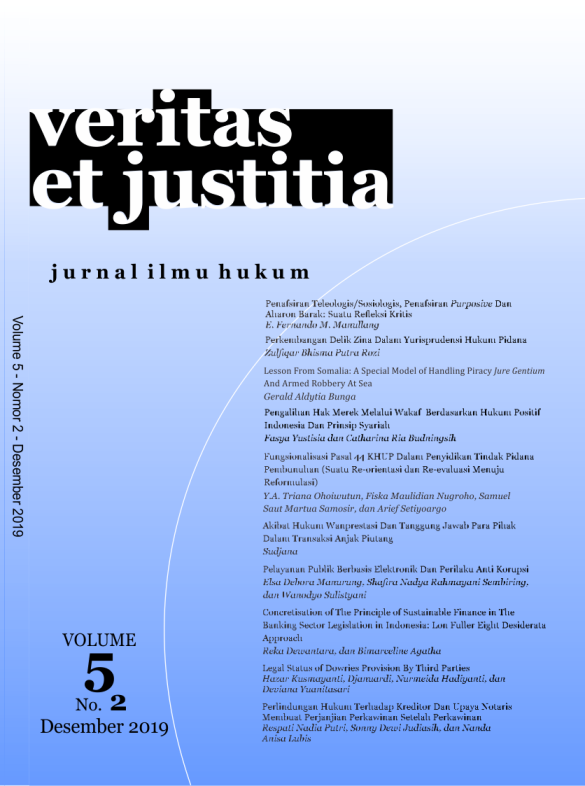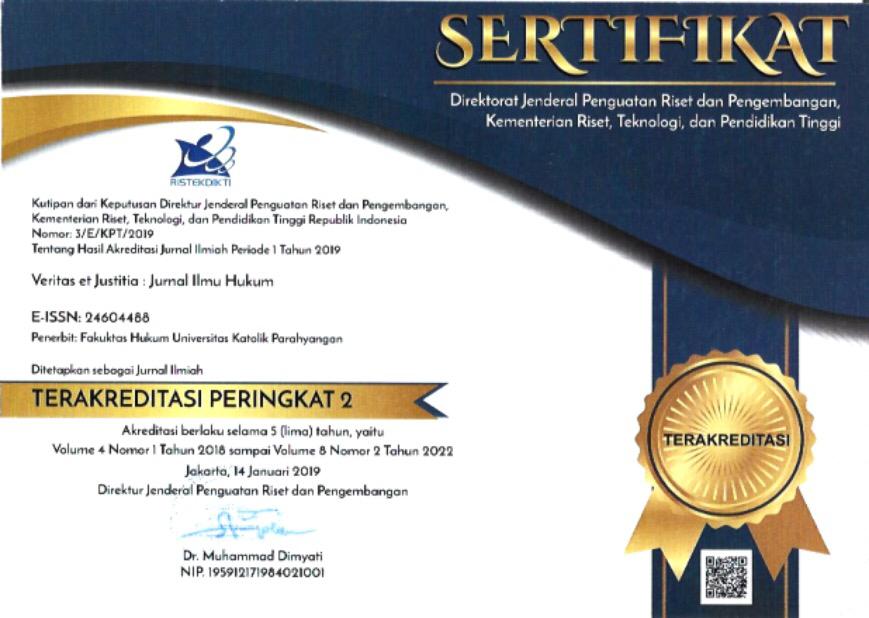PERKEMBANGAN DELIK ZINA DALAM YURISPRUDENSI HUKUM PIDANA
DOI:
https://doi.org/10.25123/vej.v5i2.3612Abstract
This article examines the concept of adultery as regulated in Article 284 of the Criminal Code. Behind this penal ruling is the intention to protect the sanctity of marriage contracts. Outside the purview of this article is extra marital sex. The author main argument is that Judges using their authority to extract and formula existing unwritten society’s appraisal and judgment on extra-marital sex. The purpose of which is to make possible penalization of couples considering guilty of committing extra marital sex. A study of existing laws and regulations, plus relevant court judgments will be undertaken, to explore the possibility of changing and extending the concept of zina (adultery) to encompass also extra-marital sex.
References
Daftar Pustaka
Buku:
Abdul Manan, Aspek-Aspek Pengubah Hukum, Kencana, Jakarta, 2013.
Adami Chazawi, Tindak Pidana Mengenai Kesopanan, RajaGrafindo Persada, Jakarta, 2005.
Ali Zaidan, Menuju Pembaruan Hukum Pidana, Sinar Grafika, Jakarta, 2015.
Andi Hamzah, Asas-Asas Hukum Pidana, Rineka Cipta, Jakarta, 2010.
Barda Nawawi, Bunga Rampai Kebijakan Hukum Pidana, Citra Aditya Bakti, Bandung, 2005.
H. Pontang Moerad BM, Pembentukan Hukum Melalui Putusan Pengadilan Dalam Perkara Pidana, Alumni, Bandung, 2005.
Lysa Angrayni, Pengantar Ilmu Hukum, Suska Press, Pekanbaru, 2014.
Makhrus Munajat, Dekonstruksi Hukum Pidana Islam, Logung Pustaka, Yogyakarta, 2004.
Satjipto Rahardjo, Pendidikan Hukum Sebagai Pendidikan Manusia, Genta Publishing, Yogyakarta, 2009.
Syamsul Fatoni, Pembaharuan Sistem Pemidanaan: Perspektif Teoritis dan Pragmatis Untuk Keadilan, Setara Press, Malang, 2016.
Zainudin Ali, Hukum Islam: Pengantar Ilmu Hukum Islam Di Indonesia, Sinar Grafika, Jakarta, 2015.
Jurnal/Artikel Ilmiah:
Any Ismayanti, Konsistensi Pasal 284 KUHP Terhadap Undang-Undang Dasar Negara Republik Indonesia Tahun 1945, Jurnal Hukum Legality, Vol.24, No.1, Maret 2016-Agustus 2016.
Budi Suhariyanto, Problema Penyerapan Adat Oleh Pengadilan Dan Pengaruhnya Bagi Pembaruan Hukum Pidana Nasional, Jakarta, Pusat Penelitian dan Pengembangan Hukum dan Peradilan Mahkamah Agung, Mimbar Hukum Volume 30, Nomor 3, Oktober 2018.
Frederikus Fios, Keadilan Hukum Jeremy Bentham Dan Relevansinya Bagi Praktik Hukum Kontemporer, Jurnal Hukum Humaniora Vol.3 No.1 April 2012.
ICJR (Institute For Criminal Justice Reform), Naskah Rancangan Kitab Undang-undang Hukum Pidana (RKUHP) Hasil Pembahasan Panitia Kerja R-KUHP DPR RI (24 februari 2017).
Lidya Suryani Widayati, Revisi Pasal Perzinaan dalam Rancangan KUHP: Studi Masalah Perzinaan di Kota Padang dan Jakarta, Jurnal Hukum Nusantara, Vol 3 Jakarta, 2009.
Internet:
Jimly Asshiddiqie, Penegakan Hukum http://www.jimly.com/makalah/namafile/56/Penegakan_Hukum.pdf.
VIVAnews, diakses pada tanggal 7 April 2019 melalui website: http://fokus.news.viva.co.id/news/read/399285-ada--kumpul-kebo--di-rancangan-kuhp, yang dipublikasikan pada Kamis, 21 Maret 2013 | 21:34 WIB
Peraturan Perundang-Undangan:
Undang-Undang Nomor 48 Tahun 2009 Tentang Kekuasaan Kehakiman.
Undang-Undang Dasar Negara Republik Indonesia Tahun 1945.
Kitab Undang-Undang Hukum Pidana.
Surat Edaran Mahkamah Agung (SEMA) No 8 tahun 1980 Tentang Perzinahan
Downloads
Published
Issue
Section
License
Authors who publish with this journal agree to the following terms:
Authors retain copyright and grant the journal right of first publication with the work simultaneously licensed under a Creative Commons Attribution License that allows others to share the work with an acknowledgement of the work's authorship and initial publication in this journal.
Authors are able to enter into separate, additional contractual arrangements for the non-exclusive distribution of the journal's published version of the work (e.g., post it to an institutional repository or publish it in a book), with an acknowledgement of its initial publication in this journal.
Authors are permitted and encouraged to post their work online (e.g., in institutional repositories or on their website) prior to and during the submission process, as it can lead to productive exchanges, as well as earlier and greater citation of published work.
The Journal allow the author(s) to hold the copyright and to retian publishing rights without restrictions.










